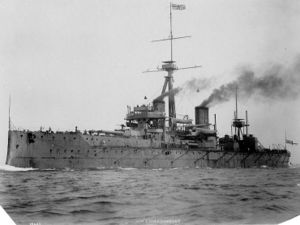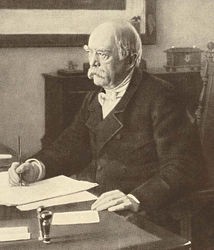The Great Illusion – Now
By Stephen Berry
The year 2008 sees the centenary of one of the most important books of the 20th century. In 1908 Norman Angell published The Great Illusion, still the best exposition of the classical liberal case against war. In honour of this occasion I will review Angell's 1939 reprint of his original work, The Great Illusion – Now . The later edition contains not only an abridged version of the 1908 work but a critique of British foreign policy in the 1930s. I will consequently divide this article into two parts: the first section will be an explanation of the arguments of the 1908 book; the second will consider how far Angell stuck to his original thesis in his criticisms of the British government's policy towards the Axis powers.
Overview of the Pre-War Book
Many people in 2008 still assume that a nation's prosperity is somehow determined by its political power. They see nations as competing units and advantage, economic or otherwise, in the final resort, goes to the possessor of the greater military force. The USA, so the argument goes, is the most powerful military and (therefore) economic power in the world.
Against this, Angell maintains that the commerce and industry of a people do not depend upon the expansion of political frontiers; that military power is socially and economically futile and can have no relation to the prosperity of the people exercising it. Wealth in the economically advanced world is founded upon credit and commercial contract, and these are the result of an economic interdependence brought about by the increasing division of labour and modern communications. As Angell puts it, “ If credit and commercial contract are tampered with in an attempt at confiscation, the credit-dependent wealth is undermined, and its collapse involves that of the conqueror; so that if conquest is not to be self-injurious it must respect the enemy's property, in which case it becomes economically futile.” (P. 116)
When a modern nation augments its territory, it no more increases the wealth of its citizens than it would add to the wealth of Londoners if London were to annex the county of Kent. Angell also contends that the forces which have rendered military power economically futile have also made difficult the enforcement of a nation's moral ideas or social institutions on a conquered people. “The moral and spiritual struggles of the modern world go on between citizens of the same State in unconscious intellectual co-operation with corresponding groups in other States, not between the public powers of rival States.” (P. 117).
The Accepted Axioms
It's no use people saying that the above is obvious. The recent invasion of Iraq saw a number of the arguments which Angell fought against being deployed in the usual fashion.
-
Is it true that the wealth, prosperity and well-being of a nation is dependent upon its military power? Self-evidently, as the left claimed the US invaded Iraq to get access to oil which would increase its economic power.
-
Can one civilisation gain moral advantage by the military conquest of another? Again self-evidently, as the right claimed they would bring democracy and the rule of law to Iraq by toppling the regime of Saddam Hussein.
Angell also dealt with such entrenched assumptions as:
-
Conquered territory adds to the wealth of the of the conquering nation. He questioned whether a nation owns the territory of another in the same way that an individual or business owns property?
-
Could Germany (remember, the book was written in 1908) take British trade and colonies by military force?
-
Does a modern nation need to expand its physical boundaries in order to provide for an expanding population?
-
If Great Britain could conquer Germany tomorrow and reduce her nationality ‘to dust', would the ordinary British subject be any better off.
Let's look at these points in a little more detail.
The Great Illusion
The wealth, prosperity and well-being of a nation depend in no way upon its military power. Smaller nations which do not possess significant military power have populations which are in every way as prosperous as those of the great powers. The income per head of Switzerland, Holland, Belgium, Denmark and Sweden does not differ dramatically from that of Germany, France and the UK. One of the major military powers of the second half of the 20th century was the USSR. But it's mighty armed forces could in no way be said to have benefited its citizens.

A Dreadnought battleship, but it was the German economic miracle, not mighty battleships, which led to the capture of British markets.
Could the Germans have taken British trade as a result of a victorious war? Trade depends on the existence of natural wealth (capital) and a population capable of working it. If the Germans had decided to ‘destroy' the British economy, this would destroy one of the main German markets, a curious form of commercial suicide. As history turned out, the Germans did begin to capture some of the British markets in the 1950s and 60s, but note that this was after a catastrophic defeat and whilst Germany was occupied by foreign troops. The German economic miracle, not mighty battleships, was the basis for the capture of British markets. In a similar fashion, the Japanese have made major inroads into certain American markets, much to the chagrin of those US citizens who believed they had won both a military and economic victory in 1945.
For similar reasons it is impossible to capture the external or carrying trade of a nation by conquest. Large navies are impotent to create trade for the nations owning them and in peace can do nothing to limit the commercial rivalry of another nation. Nor can a conqueror destroy the competition of a conquered nation by annexation. Angell points out that if Germany conquered Holland, German merchants would still have to meet the competition of the Dutch. In fact the competition would be more intense because the Dutch would be within the German customs lines.
As the only feasible policy in the modern world is for the conqueror to leave the wealth of the territory in the possession of its occupants, it is a fallacy for nation to think that it is increasing its wealth when it increases its territory. When a province or state is annexed, the population of that state is also annexed. There is a change of administration which may be good or bad, but there is no transfer of one group of owners to another. When Germany annexed Alsace in 1871, no German citizen was enriched by goods or property taken from Alsace. Although in 1908 Canada was part of the British Empire, the British merchant could be driven from the Canadian market by the US or Swiss merchant. The Dutch citizen, whose government possesses no considerable military power is just as well off as the British citizen and considerably better off than his Russian counterpart.
Angell points out that a rough and ready index of the relative wealth and security of a nation can be measured by how the government debt is regarded. He notes that countries such as Holland and Norway noticeably outperform the empires of Germany and Russia in this regard. “The citizens of Switzerland, Belgium or Holland, countries without ‘control', or navy, or bases, or ‘weight in the Councils of Europe' are just as well off as Germans, and a great deal better off than Austrians or Russians.” (P. 142)
We must be clear about what all this shows. The argument cited does not show that armaments or the absence of them to be the sole or even the determining factor in national wealth or poverty. Nor indeed, that there are no advantages to a large national area. Plainly, absence of tariffs would be one. But the argument just outlined shows that security of wealth is due to something other than armaments. The absence of political power is no obstacle to prosperity any more than the possession of such power guarantees it. By the same token, the mere size of an administrative area is no guide to the wealth of those inhabiting it “any more than it would be true to say that a man living in London is richer than a man living in Liverpool, because the former city is larger, and has a bigger budget.” (P.142)
The commonest criticism which Angell had to face to this part of his thesis was as follows. It is true that political conquest does not involve the change of property titles, but had he not overlooked the collection of taxes by the conqueror? When Alsace was annexed by the Germans in 1871, the inhabitants paid their taxes to Germany rather than France. Was not Germany wealthier as a result? “If Alsace-Lorraine had remained French it would have yielded at the present rate of French taxation, a revenue of eight million to the state. That revenue is lost to France and placed at the disposal of Germany,” (P.146) claimed a writer in the Daily Mail of the time.
Angell had much entertainment pointing out that the writer had forgotten that the citizens of Alsace were also the beneficiaries (in so far as citizens who have had part of their income confiscated can be called ‘beneficiaries') of the German state. In modern states, revenues extracted from citizens are, after deductions to keep the political class and its army of lackeys operating, handed back to citizens in a form that is calculated to inspire their gratitude.

Bismarck annexed Alsace-Lorraine in 1871, but did the German citizen benefit economically?
But, as Angell pointed out in 1908, if the Germans really derived eight million from their annexation of Alsace-Lorraine, how much did the British draw from the possession of their worldwide empire? “On the basis of population, somewhere in the region of a thousand million, on the basis of area still more – enough not only to pay all our taxes, wipe out our national debt, support the army and navy, but give every family in the land a fat income into the bargain. There is evidently something wrong.” (P. 147) Indeed there was, and it is one of the best kept secrets of history (despites the efforts at illumination by Adam Smith, Richard Cobden and John Bright) that empires are a burden, not a benefit to the citizens of the imperial power. British children were told that ‘we own a fifth of the world's surface and a fourth of the world's population.' So why, Angell mused, was the Chancellor of the Exchequer “ at his wit's end for a few millions for our social services” (P. 184). Only when you realise that an increase in territory controlled does not translate automatically into an increase in wealth can we achieve a satisfactory answer to this question.
Conquest and the Population Question
This argument (circa 1908) could have been be summed up in the following way. ‘Germany had to expand. A growing population was crying out for more room. Germany needed to ensure itself a secure food supply and this was not a choice, rather a stern necessity. The same struggle which sent the Teuton across the Rhine and Alps a thousand years ago was once more a driving force. It was the ultimate struggle for bread'. This mistaken belief had tragic consequences in the 20th century. Both Germany and Japan, in their respective quests for land or
‘living space' ( Lebensraum ) in the Ukraine and mainland China, precipitated major wars and immense destruction.
Angell goes straight to the point. “If Germany conquered Canada, could the Germans get the wheat for nothing? Would not the Germans have to pay for it just as they do now? Would conquest make economically any real difference?” ( P. 197-198). In the same way, when the US and its allies conquered Iraq in2008, did not the American consumer still have to pay for oil on the world market?
In fact, there is little difficulty in obtaining goods on the world market if you are willing to pay. Do nations tend to withhold their produce from others? Quite often the opposite complaint is made of them, namely that they are ‘dumping' their goods at knockdown prices. The real problem of a modern economy is not of absolute shortages, given the immense productivity of modern processes. Rather it is to avoid the dislocation caused by wars supposedly ‘to ensure the survival of populations'. To the extent that groups fight each other, they fail to make use of the resources available for sustenance. Where half a million Red Indians (Native Americans) divided into tiny nations perpetually at war lived on the economic margin, 300 million modern Americans now live amidst plenty.
The history of the world economy since 1945 shows that both Germany and Japan could flourish without ‘living space' or empire. They did not need to conquer territory to feed an expanding population. Instead they could buy the goods they needed from other countries who were only too eager to supply them with their every need.
The Indemnity Futility
Angell points out that the analogy which many people make in their mind between payments of one person to another and one nation to another is quite fallacious. Payments of great sums between nations can only be made in the long run in goods and services. On the morrow of a bitter war, would the victor be in mood to see his home or world markets ‘swamped' by enormous quantities of goods produced by the defeated enemy state in order to pay an indemnity. As Angell presciently pointed out, “ The difficulty in the case of a large indemnity is not so much the payment by the vanquished as the receiving by the victor.” (P. 87)
The indemnity question is not separate from the population question. It is all part and parcel of the book's theme concerning the difficulty of transferring by physical coercion wealth from one nation to another. Getting another nation's goods is not a problem in the modern world. Rather, we must maintain the smooth workings of the world markets by which goods are freely available. Indemnities and military tributes tend to dislocate these very markets.
Angell was strongly criticised for the indemnity chapter in The Great Illusion . An economist wrote to him, “ There are some interesting and valuable suggestions in your book, but I do beg you to keep out of it the sort of ‘too clever by half' stuff which you have put into the chapter entitled ‘The Indemnity Futility'. It is a mixture of protectionist fallacies and unfamiliarity with the exchange apparatus. That sort of gaudy brick will jeopardise the whole building and I think you would be wise to drop it entirely.” But Angell lived long enough to see the fiasco which surrounded the payments of debts and reparations subsequent to World War One. It was his judgement which was vindicated by events.
‘But Some Profit by War'
Is not war inherent in the capitalist system? At least you will admit that certain capitalists profit from wars which they have sought to bring about? These are two of the most common positions held by people of the left of the political spectrum. We will examine these ideas in reverse order.
Yes, certainly some capitalists profit as a result of war. Angell points out that some capitalists (chemists and drug companies) will profit as a result of a smallpox epidemic. “But those isolated interests who benefit by smallpox are not able to use as much influence to promote it as armament-makers and others sometimes use to promote wars.” Why are the smallpox profiteers powerless and the war profiteers powerful?” (P. 212)

Woolwich Royal Arsenal. Arms manufacturers profit from war, by why do we let them?
No one is able to persuade the public that it benefits from smallpox, or that it is a duty to get it, or it is noble, or patriotic. Those who profit by war are only powerful because they can use arguments that war is advantageous, right and glorious. The answer to the war profiteers is to create in the mind of the general public the same feeling about war which it now has about smallpox. Remember also that it cannot be simply a matter of the wealth or cleverness of the capitalist class because in this respect at least, the capitalists do not act together. The vast majority of capitalists will lose financially during a war, though they could well support the war because they have fallen prey to the same fallacious ideas that have entranced the workers.
The argument of vested interests behind war is sometimes enlarged into something wider, namely that capitalism itself is somehow the cause of war. This is not the case as Angell shows quite clearly with a vivid example. “Suppose”, he says, “that the original thirteen colonies of North America had failed in their efforts at federation and after their separation from Britain had followed more the line the South American colonies of Spain had followed, breaking into separate nations, so what is now the United States made half a dozen different nations; a French-speaking one perhaps in Louisiana, a Spanish speaking one on the West coast, a Dutch in the Hudson valley, and English in New England.” (P.213) Imagine that each of these nations had its own army, currency, tariffs and rights to rivers and lakes, we can be pretty sure of what would have happened. There would have been war between Louisiana and New England just as there was war between Chile and Peru. There would exist between the independent American states that which exists between independent European states, such as France and Germany – historical grievances, bitter national feuds and lying school history books.
And to what should we ascribe these disputes between the independent U.S. states? Capitalism? But capitalism exists in all the individual American states now and they do not fight each other. They do not fight each other because they are not independent nations. In the 20th century we had war between the European states and peace between the North American states not because there is capitalism in Europe and no capitalism in the USA. We know there is capitalism on both continents. The cause of war in Europe in the 20th century was anarchic nationalism. The cause of peace in the US was the federal bond.
Capitalism in its economic theory is just as internationalist as socialism; in its practice it is rather more so. It is the workers who are anti-immigrant, the capitalists who employ the foreign workers. Angell was writing in 1908 and he noted that the impetus for the anti-Alien, anti-Negro, anti-Chinese and anti-Japanese legislation in the U.S., Canada and Australia came from the workers who were worried about their jobs and anyway did not much care for these interlopers.
Human Nature and Human Institutions
“' You forget', says the retired major-general, with the kind of smile that indicates that he possesses the final, the complete, the annihilating answer to the advocates of peace, arbitration, international courts, disarmament, internationalism, ‘you forget human nature. Man is a fighting animal, pugnacious, quarrelsome, irrational, ready to fight for a sign, rarely guided by reason.'” (P.225) So Angell puts the argument which you are bound to meet after you have quaffed a few pints of good ale at your local hostelry.
As Angell points out, if a man were always able to see the point of view of the other chap, always being a fair judge in his own cause, we should have no need of peace conferences, treaties and the like. But neither would we need constitutions, laws, courts and the police. All these institutions are ways to deal with the imperfections of the human condition. It is beside the point to say that man can be a rather perverse creature. Because some sewage is bound to creep into all water is no reason to kill ourselves by drinking typhoid germs. The question is whether or not you believe in the principle of keeping water clean. Disease may be inevitable, but that is no argument against taking all possible precautions against it. Likely as not, there will always be crime, undetected murders, but is this an argument for abolishing the police force?
It may be that some war is inevitable on this planet. National constitutions break down and we have civil wars. That does not mean that every state must drift towards the condition of an African republic where each general election is the preparation for the next civil war. There is simply no reason why all efforts should not be made to make war less likely. After all, disease is almost certainly inevitable, yet in the West, plague, cholera, leprosy have been wiped out. This is a gain and similar gains could be made if people were aware that there are no winners in a war.
What Makes Us Fight? And Need We?
Men love power and domination very much. But if we realise that it will not give us what we want, we will turn to co-operation instead. That men should struggle is perhaps part of their nature, but what they struggle about is the result of nurture, habit and tradition. In some areas of the world men no longer fight about religion. Angell believes that we could as readily come to see that it is irrelevant and self-defeating to fight about our nationalisms.
Nations do not fight for money or investments, they fight for their rights, or what they believe to be their rights. But because men act from motives that have little relation to advantage, is it useless to discuss the disadvantages of a given line of conduct? To talk as though man must always gratify his pugnacity as he has always done in the past is to challenge all human experience. It is true that we want to satisfy national pride of place and our dislike of foreigners. These are no doubt strong impulses. But we also do not want to ruin our trade, our national prosperity and if it is brought home that the satisfaction of one impulse will bring about economic damage, we may very well change our actions.
Conclusion
If the reader has drawn the conclusion from the above that Angell was a pacifist then he has made a mistake. “Are we immediately to cease preparation for war, since our defeat cannot advantage our enemy nor do us in the long run much harm? No such conclusions result from a study of the considerations elaborated here (my italics). It is evident that so long as the misconception we are dealing with is all but universal in Europe, so long as the nations believe that in some way the military and political subjugation of others will bring with it a tangible material advantage to the conqueror, we all do, in fact, stand in danger from such aggression.” (P. 265) Angell believed one-sided disarmament to be futile and he did not advocate it. “So long as the current political philosophy in Europe remains what it is, I would not urge the reduction of our war budget by a single sovereign.” (P.265)

Henry IV of France. He had a flawless Grand Design
Ultimately, Angell believed that there had to be a sense of common interest between nations. When this had been achieved, we could make our armies and navies the common police of civilisation, standing behind commonly agreed rules. He was no advocate of world government. “There have been many such in the past, as there will be many in the future. One of them was known as ‘the Grand Design of Henry IV,' and of it a fellow monarch said this: ‘It is perfect. There is not a flaw in it, save perhaps this: not a single earthly prince would dream for a moment of agreeing to it. ' And that is the defect of all these paper schemes drawn up in disregard of the existing way of thought, of feeling.” (P.270) Instead, Angell wished to change our views about an important institution. A multitude of things which our ancestors thought of as justified – human sacrifices, slavery, dictatorship, judicial torture and duelling – we now regard as wrong or just plain silly. Angell wanted to place war in this same category of institutions which had long since served any useful purpose. His book, if properly understood, would be a giant step in this direction.
A review of Norman Angell's critique of British Foreign Policy in the 1930s follows.
![]()
 Top 50 books of all time : by Old Hickory:-
Top 50 books of all time : by Old Hickory:-
"I have limited the selection to the books I have read. I keep to the norm of not recommending to others books I have yet to read. Clearly, books I have not read by now suggests a judgement of some sort."
PDF version
of this article
![]()
Download
Requires Adobe Acrobat Reader. This is available
for free at www.adobe.com
and on many free CDs.

The Alternative
Bookshop
Which specialises in,
but does not limit itself
to, books on Liberty
and Freedom ... Book
reviews, links,
bestsellers, rareties,
second— hand,
best price on books,
find rare books.
|
|
|
|
|
|
|
|